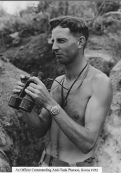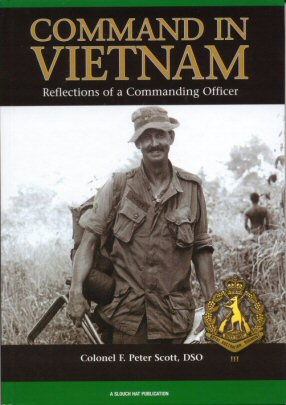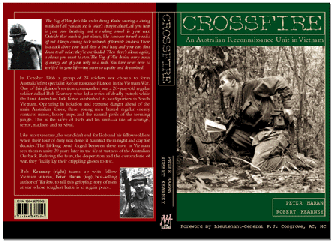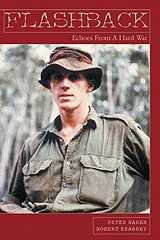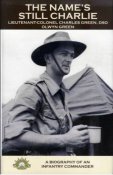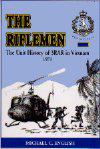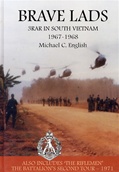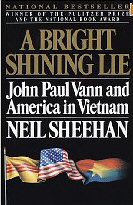|
3rd Battalion Royal Australian Regiment
Your FaithfullyJapan - Korea - Malaya - Borneo - Vietnam - East Timor - Solomons - Iraq - Afghanistan |
3rd Battalion
Royal Australian Regiment
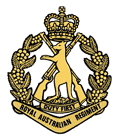
Publications
(Note: Books may be out of print)
THE FORGOTTEN WAR PAYMENT |
Sadly - All other books are out of print.
- Command in Vietnam by Colonel F. Peter Scott, DSO (Vietnam)
- Crossfire by Peter Haran & Robert Kearney (Vietnam)
- Flashback by Peter Haran & Robert Kearney (Vietnam)
- Brave Lads by Mike English (Vietnam)
- The Name's Still Charlie by Olwyn Green OAM (Korea)
- The Riflemen by Mike English (Vietnam)
- Trackers by Peter Haran (Vietnam)
- The Diggers Own Stories Produced by the 3 RAR Corporation
- A Bright and Shining Lie by Neil Sheehan (Vietnam)
| 3rd Battalion Association Find us on Fabebook |
All well worth reading and passing onto your children as a memento of your service.
COMMAND IN VIETNAM
Reflections of a Commanding Officer
Command in Vietnam: Reflections of a Commanding Officer Colonel F. Peter Scott, DSO
Reviewed by Brigadier John Essex-Clark
Amongst the many writings and well-illustrated histories about Australian infantry battalions serving in Vietnam, too few commanding officers have expressed their emotions, background influences, motivations, and feelings about leading Australian 'diggers' in that country and that war. This crisply written and straightforward, compressed autobiography, concerning Peter Scott's command of the Third Battalion, the Royal Australian Regiment, does just that. Not one to wax lyrical about his personal achievements, Peter Scott succinctly covers his fascinating developmental experiences in both Korea and Vietnam in only 160 pages, including interesting appendices and an adequate glossary and index. He describes the extraordinary pressures on him when commanding an infantry battalion in what we now are wont to term asymmetric war fighting. Scott recounts these experiences in an easily readable, chronological story supported by pertinent illustrations, but the book would have benefited by the inclusion of more maps and diagrams than the lone one of Phuoc Tuy Province. Obviously a very sensitive yet pragmatic man, and with an occasional dry sense of humour, Peter Scott manages to take his reader smoothly with him through his formative years as a Duntroon cadet and his initial experiences as a young officer in the occupation force in Japan after World War II. The professional focus then shifts to his combat experiences in the cauldron of Korea after the North Korean and Chinese invasion of the South; and then finally into Vietnam. Peter Scott's command of 'Old Faithful', 3RAR, on their second tour of Vietnam in 1971, was for only seven months, a relatively short period compared with the twelve-month tour of duty of the other battalions and their commanders. Also, enemy activity in Phuoc Tuy Province during Scott's time there had been much reduced by the aggressive efforts of the many battalions preceding his unit's deployment. So, the enemy was not the threat it had been in the 1966-1970 period of 1st Australian Task Force operations. Nevertheless, Scott's 3RAR was constantly on operations from the time they arrived until the moment they left, and he well describes his thoughts about the major operations of PHOI HOP through BRIAR PATCH and OVERLORD, to the final run-down period ending Australia's combat involvement in South Vietnam. During his time in Vietnam, Scott was faced by few tactical problems as a CO because, as he states, it was then a platoon commander's war. His major tactical task was retaining a mobile reserve should things go awry.
The major and enduring command task facing him in Vietnam was administering and provisioning his men, and maintaining their morale. In doing this, Scott also shows a special admiration and a respect for the quality of National Servicemen in his battalion, as he does also for his battalion's supporting artillery, armoured, engineer and aviation elements. Peter Scott also describes the many problems he faced with the training and administrative preparation of his battalion before they deployed to Vietnam. He even covers the tricky complexities of forming the battalion's pipe band. Most of the key players in his battalion team and his senior commanders are mentioned. They appear to have all been a very cohesive and happy group compared with some other battalions who experienced frictions from within and without their number. This was probably due much to Scott's previous experience and what comes across in the book as his sensitive and understanding leadership style.
To students of leadership in war, Scott provides a telling and pertinent analysis of the differences between his command in the unconventional low-intensity war of Vietnam compared to that of his commanding officer in the higher intensity conventional war in Korea. This is based on his very close observations of the then CO 3RAR, the redoubtable Lieutenant Colonel Frank Hassett (later to become General Sir Francis Hassett and Chief of the Australian Defence Force Staff). What Scott leaves unmentioned is how politically-inspired rules-of-engagement, and an end-of-the war withdrawal syndrome, may have hamstrung his tactical options in Vietnam to an extent that Hassett's never were during Operation COMMANDO in Korea. The author's analysis of his application of the principles of war to his thinking and his battalion's activities in Phuoc Tuy Province makes most interesting and challenging reading, especially his assessment of the application of offensive action. This chapter could prove to be the most controversial in the book.
This is a straightforward, no fuss, interesting and educative book written by a steadfast but quiet and unemotional warrior of the old school. It is not a history but is very much, as the title indicates, his 'reflections'. As David Thomson states in his foreword, it should be recommended reading for all aspiring young officers. To which I would add, especially those who aspire to command an infantry battalion in politically-inspired, rules-of engagement-restricted, modern asymmetrical warfare. My simple criticism would be of the un cropped cover photograph. This depicts the happy and dog-tagged, pistol and pack-carrying warrior-commander going to battle holding an aluminium folding stool, with a naked soldier in the background - all rather disconcerting. This, however, would probably not have been the decision of the author and in no way reflects the contents of this cameo of command.
Colonel F. Peter Scott, DSO, 'Command in Vietnam: Reflections of a Commanding Officer', Slouch Hat Publications, McCrae, Australia, 2007, Casebound, 160pp., RRP $A49.95.
Colonel F. Peter Scott, DSO : Commanding Officer 3RAR 1969-1972
- Includes roll of honour and nominal roll.
- Includes index.
- Bibliography: p. 156-157.
TO ORDER: www.slouch-hat.com.au
"The Riflemen" and that is available through Australian Military History Publications at 02 9521 6515 and they have their own web site too where it can be ordered.

CROSSFIRE
By Peter Haran & Robert Kearney
Sergeant Robert Kearney's first Tour of Duty in South Vietnam in 1966 with 5 RAR. This is a story of a specialist rifle Platoon - The Reconnaissance Platoon.
Again their story is different to Charlie Company 3 RAR's story, but it adds to the rich tapestry of the Australians in Vietnam.http://www.vietnam-crossfire.com/
Foreword by:Lieutenant-General Peter J. Gosgrove, AC, MC, Chief of Army,
Australian of the Year 2001
The Fog of War feels like scuba diving. You're wearing a diving mask and all you can see is what's straight ahead, all you can hear is your own breathing and a rushing sound in your ears.
Outside that mask is just silence, like someone turned a radio off but it keeps coming back in bursts of terrible loudness. There is a crack above your head and then a loud bang and your ears shut down to all noise: they're overloaded.
Then there's silence again, a silence you want to stop. The Fog of War drains every ounce of energy out of your body in a rush; you have never been so terrified in your life-but never so capable and determined......
In October 1966 a group of soldiers were chosen to form Australia's first specialist Reconnaissance platoon in the Vietnam War. One of this platoons section commanders was a 20-year old regular soldier, Bob Kearney, who led a series of deadly patrols through the jungles of Phouc Tuy Province while the First Australian Task Force established its headquarters in Nui Dat.
Operating in isolation and extreme danger ahead of the main Australian forces these young men braved regular enemy contacts, mines, booby traps, and the natural perils of the teeming jungle.
Crossfire is the story of Bob and his mates in a tale of courage, terror, madness and survival.
Like most veterans, the war didn't end for Bob and his fellow soldiers when their tour of duty was done: it haunted them night and day for decades. The life long bond forged between these men in Vietnam: sees them reunite 30 years later in the silent vastness of the Australian Outback. Reliving the fears, the desperation and the camaraderie of war, they finally lay their crippling ghosts to rest.
Bob Kearney teams up with fellow Vietnam veteran, Peter Haran best selling author of Trackers to tell this gripping story of men at war whose toughest battle is to regain peace.

FLASHBACK
By Peter Haran & Robert Kearney
Seven young Australian soldiers find themselves caught up in the madness and brutality of the Vietnam War. one dies, six survive after being wounded - only to find there are worse things than dying on the battlefield.
Covering the events during their tours of duty between 1966 and 1972, Flashback vividly portrays the ordeals these men encountered while each man's story is also a journey through the affects of post-traumatic stress and the dislocation of post-war service
RRP: $24.95
ISBN: 9781741100006
Size: 207mm x 135mm
Format: Soft Cover

The Name's Still Charlie Charlie
Lt Col Charles Green - 2nd Edition
The Biography of an Infantry Commander
Author: Green, Olwyn
Edition: 2nd Edition (1st Edition 1993) Published: 2010
Publisher: Australian Military History Publications (Internet site)
Cover: Hard Cover with Dust Jacket - 323 pages
Charles Green initially trained with the 41st Battalion from 1930. In World War Two he served with 2/2nd and 2/11th Battalions. In 1950 he rejoined as a Lieutenant Colonel (Commanding Officer) of 3rd Battalion (The Royal Australian Regiment) 3 RAR and fought in Korea where he was mortally wounded by Chinese mortar fire.

THE RIFLEMEN
Michael C English
The 3RAR went to Vietnam in the last years of Australia's military commitment and when operations were winding down within Phouc Tuy province. By then the Viet Cong in the area were reduced to low level activities because of Australian control. Well illustrated with many original maps, this new book fills a gap in the Australian military experience.
Mike English from Alpha Company detailed the history of 3 RAR's Tour Of Duty in South Vietnam 1971. If you are interested in how an Infantry Battalion operated in South Vietnam, then this is an excellent book and will also give the reader an insight into the inner workings of an Australian Combat Battalion.
AVAILABILITY: "The Riflemen" is available through Australian Military History Publications & Gould Geniology & History
WEBSITE:
http://www.warbooks.com.au/Individual Books/theriflemen.html & also at http://www.gould.com.au/Brave-Lads-3RAR-in-South-Vietnam-p/amh076.htm

BRAVE LADS
By Mike English
The History of the 3rd Battalion (The Royal Australian Regiment) in Vietnam 1967 to 1968
'Brave Lads' is a long-awaited unit history that fills a gap in the Australian military experience in South Vietnam.
The Third Battalion, The Royal Australian Regiment (3RAR) first served in Vietnam in 1968 and later had a second tour of duty in 1971.
In 1968 3RAR was based at Phuoc Tuy Province but also operated outside their area of operation as the need dictated. The until fought in the Tet Offensive in early 1968 and later operated in the Long Hai Hills where it sustained many casualties as a result of mines.
In May-June of that year, the battalion successfully held off several determined enemy attacks at Fire Support Base 'Balmoral', and with the Australian military commitment at its height, the battalion continued its active patrolling and ambushing at a high level of activity.
The loss of men due to illness or wounds, or for any other reason, were not usually replaced, which placed a strain on those soldiers still serving on operation. In the second tour (1971) the battalion again encountered problems but despite that, the unit showed a high degree of professionalism in its actions against an ever-aggressive and sometimes elusive enemy.
This history pays tribute to the Brave Lads of 3RAR in their tumultuous year in Vietnam where hard work and ever-present danger, were constant companions.
This is actually a compilation of two books in one. The first title "Brave Lads" is a new publication, the second "The Riflemen: A History of the 3RAR Second Tour of Duty in Vietnam" was first published in 199
AVAILABILITY: "Brave lads" is available through Regimental Books Australia at
WEBSITE: http://regimental-books.com.au/shop/brave-lads-3-rar-in-south-vietnam-1967-1968-p-183/

TRACKERS
By Peter Haran
THE UNTOLD STORY OF THE AUSTRALIAN DOGS OF WAR
It was a classic point. Caesar's ears shot out, he went rigid and his body froze.
These words describe the final phase of a track where the war dog gives his troops the tactical advantage of surprise over the enemy. It is also within minutes or maybe just seconds of a ferocious jungle battle.
The author, infantryman, Private Peter Haran, was holding the lead to Caesar, as he did throughout most of this excellent book.
I found this account of Australia's tracking dogs in South Vietnam to be both enthralling and moving. This is very much because Peter Haran is an outstanding storyteller. Indeed this is one of the most compelling publications I have read on the Vietnam War and I didn't put it down until I finished it.
The author's graphic portrayal follows his involvement as the dog handler, initially of the rogue, Damian, and then of the larrikin Labrador-Kelpie cross, Caesar, from the time of his early training days in the Tracking Wing at Ingleburn's School of Infantry and on the austere and rugged Helensburgh training range, to the highly dangerous combat operations against the Viet Cong and North Vietnamese forces in the jungles of South Vietnam.
Told in the typical colourful language of the Aussie digger, this gritty story tells of relationships and bonds between man and dog, particularly the author and his mate, Caesar, as well as between fellow visual trackers/handlers and between their respective dogs. It is interesting, stirring, amusing, and most of all it is engrossing.
The Tracking Wing had a short life from 1966 till the end of Australia's involvement in this war, but its products of tracking teams, visual trackers, war dogs and their handlers had a major impact upon infantry operations against the enemy. Anyone who experienced the benefit of having these trackers available to assist in pursuing a withdrawing enemy will not only enjoy this book thoroughly but will also gain a more intricate knowledge of how these courageous specialists at the sharp end executed their skills. I can also recommend this book to those soldiers further from the infantryman's battles, as well as to those who have never worn a soldier's uniform, as it will help bridge that gap of knowledge, which for non-combatants, is near impossible to otherwise comprehend.
For members of 5RAR, this book will reignite your own memories of your exploits with the tracker dogs, Caesar (who was handed on to other battalions following the author's tour of duty with him in 2RAR), Juno and Justin.
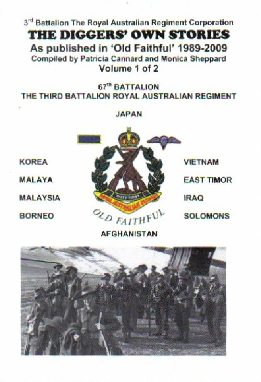 |
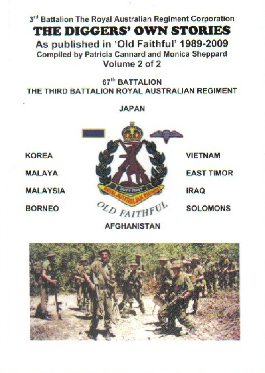 |
THE DIGGERS OWN STORIES
Forward
by
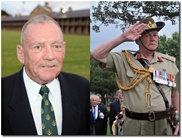
Major General B W Howard, AO, MC, ESM (Retd)
Colonel Commandant The Royal Australian Regiment
It is an honour to provide this foreword to what is a most important addition to the life and times of 3 RAR. I was fortunate to serve in ‘Old Faithful’ three times, so I know many of the contributors to the stories, which reach back to the early days in Japan, and through the eyes of those who were there, take the reader through the Korean campaign, the operational tours in Malaya, Malaysia and Vietnam. I trust that one day there will be a third volume, which will complete the Vietnam story and provide us with similar insights into more recent operations and battalion life in general these days
Official histories can only record the events, and as meritorious as such great battles as Kapyong, Maryang San and Balmoral were, the official accounts cannot tell the human side, which readers will find in great abundance in the two volumes of the ‘Diggers’ Stories.’ After all, the Royal Australian Regiment is all about people. Sadly, some of them are no longer with us, but their stories bring them to life, and give those who follow a very personal insight into ‘our battalion’ at war and peace.
There is something for everyone in the two volumes of ‘The Diggers’ Own Stories’. There are tales of great courage, of fear, of humour, of sadness at mates lost, and above all of many of the men who have made 3 RAR the fine battalion it is today, told simply and in their own words. I commend all those responsible for this excellent initiative, particularly Mrs Pat Cannard, for a fine effort on behalf of all those who have served and will serve in ‘Old Faithful’.
Duty First
B. W. (Hori) Howard
The Diggers Own Stories Information downloads
List of Contents Book 1 here...............
List of Contents Book 2 here................
Contributor list for both books here.......
Quotes and reference here...................
The Diggers’ Own Stories is a compilation of stories and articles submitted to the
3 RAR Association/Corporation journal from 1988-2008.
Published by The 3rd Battalion
The Royal Australian Regiment
as part of the corporations 20th birthday celebrations.
Contact: Bob Dabinetts. 0419 143 498
The 3 RAR Corporation also produces a quarterly journal of 60 pages
of stories, information and photographs.
***
Recommended Reading by the 3 RAR,com Webmaster

A BRIGHT SHINNING LIE
By Neil Sheehan
John Paul Vann and America in Vietnam
A True Story
A Bright Shining Lie: John Paul Vann and America in Vietnam is a book by Neil Sheehan, a former New York Times reporter who covered the Vietnam War. It is about U.S. Army retired Lieutenant Colonel John Paul Vann and the United States involvement in the Vietnam War. Sheehan was awarded a Pulitzer Prize for Non-Fiction in 1989 and a National Book Award in 1988. A film adaptation, A Bright Shining Lie, was released by HBO in 1988 starring Bill Paxton and Amy Madigan.
Synopsis
John Paul Vann became an adviser to the Saigon regime in the early 1960s. He was an ardent critic of how the war was fought, both on the part of the Saigon regime, which he viewed as corrupt and incompetent, and, as time went by, increasingly, on the part of the U.S. military. In particular, he was critical of the U.S. military command, especially under William Westmoreland, and their inability to adapt to the fact that they were facing a popular guerrilla movement while backing a corrupt regime. He argued that many of the tactics employed (for example the strategic hamlet relocation) further alienated the population and thus were counterproductive to U.S. objectives. When being unable to influence the military command, he often used the Saigon press corps, Sheehan among them, to leak his views.
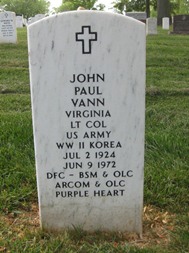
Arlington Cemetery Section 11
Photograph taken by the webmaster in person, April 2012.
 |
| The 3 RAR Internet site gratefully acknowledges the assistance of 101 design of Wollongong. www.101design.com.au |
